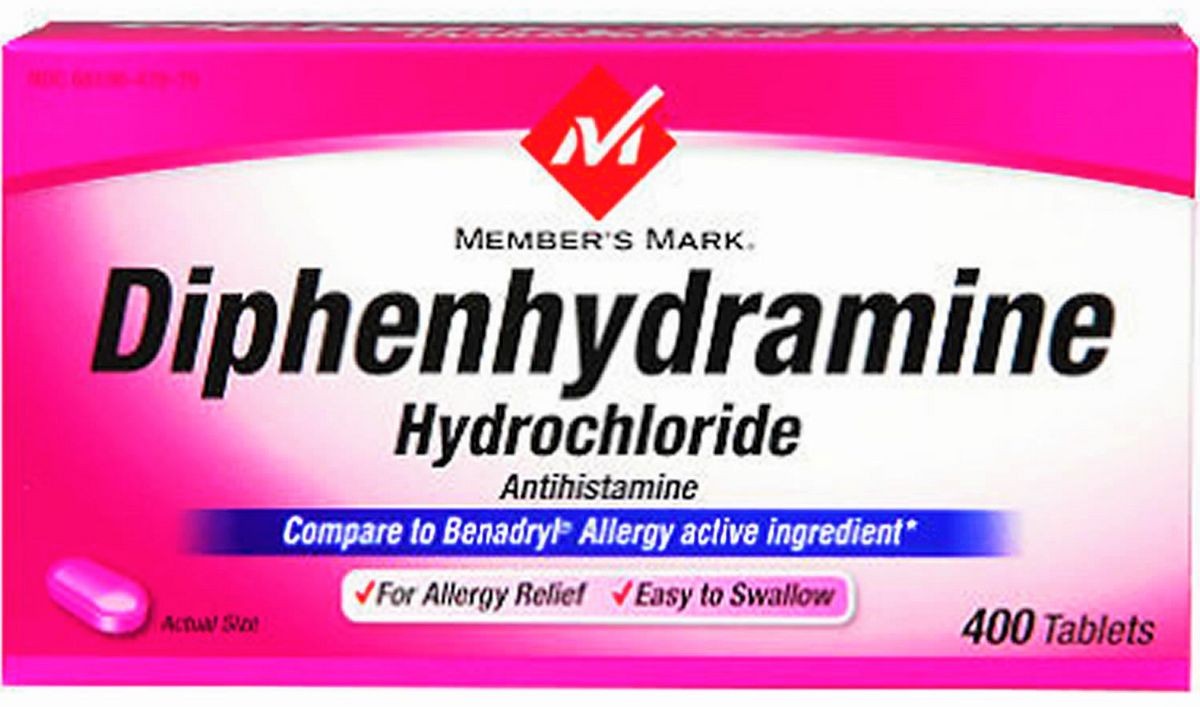
diphenhydramine – injection, Benadryl
Diphenhydramine injection is an antihistamine used to treat life-threatening allergic reactions (anaphylaxis) along with epinephrine and other treatments. It is also used to relieve symptoms of household allergies, hay fever, and the common cold when medication cannot be given by mouth. Common allergy symptoms relieved by antihistamines include rash, itching, watery eyes, itchy eyes/nose/throat, cough, runny nose, and sneezing. It is also used to treat nausea, vomiting, and dizziness caused by motion sickness when medication cannot be given by mouth. Diphenhydramine blocks histamine, a natural substance made by your body during an allergic reaction. It also blocks acetylcholine, another natural substance made by your body that causes drying effects such as watery eyes and a runny nose. Diphenhydramine should not be used in newborns or premature infants due to an increased risk of side effects. This section contains uses of this drug that are not listed in the approved professional labeling for the drug but may be prescribed by your healthcare professional. Diphenhydramine injection is also used alone or with other medications to treat shaking (tremor) and muscle stiffness caused by Parkinson’s disease when medication cannot be given by mouth. It may also be used to treat side effects of certain psychiatric drugs such as involuntary movements and muscle stiffness (e.g., EPS). It blocks acetylcholine. (See also Uses section.)
This medication is injected into a vein or muscle as directed by your doctor. If this medication is injected into or just under the skin, it can destroy the skin and tissues around the injection site (necrosis). Learn all preparation and usage instructions from your healthcare professional if you are giving this medication to yourself at home. Before using, visually check this product for particles or discoloration. If either is present, do not use the liquid. Do not use this medication more often than prescribed. Your dosage is based on your medical condition and response to therapy. Inform your doctor if your condition does not improve or worsens.
Drowsiness, dizziness, headache, irritability, stomach upset, vision changes, decreased coordination, constipation, or dry mouth/nose/throat may occur. These effects may decrease as your body adjusts to the medication. If they persist or become bothersome, inform your doctor. To relieve dry mouth, suck on (sugarless) hard candy or ice chips, chew (sugarless) gum, drink water, or use a saliva substitute. Diphenhydramine can dry up and thicken the mucus in your lungs, making it more difficult to breathe and clear your lungs. Be sure to drink plenty of fluids unless otherwise directed by your physician. Tell your doctor right away if you have any serious side effects, including: mental/mood changes, pounding/irregular heartbeat, ringing in the ears, seizure, difficulty urinating. A very serious allergic reaction to this drug is unlikely, but get medical help right away if it occurs. This is not a complete list of possible side effects. If you notice other effects not listed above, contact your doctor or pharmacist. Before using diphenhydramine, tell your doctor or pharmacist if you are allergic to it or if you have any other allergies. This product may contain inactive ingredients that can cause allergic reactions or other problems. Talk to your pharmacist for more details. Before using this medication, tell your doctor or pharmacist your medical history, especially of: breathing problems, glaucoma, heart problems, high blood pressure, liver disease, mental/mood disorders, seizures, stomach problems, overactive thyroid, difficulty urinating.
QUESTION
Drug interactions may change how your medications work or increase your risk for serious side effects. Keep a list of all the products you use and share it with your doctor and pharmacist. Do not start, stop, or change the dosage of any medicines without your doctor’s approval. Some products that may interact with this drug include: antihistamines applied to the skin, antispasmodics, drugs for Parkinson’s disease, MAO inhibitors, tricyclic antidepressants. Tell your doctor or pharmacist if you also take drugs that cause drowsiness such as certain antihistamines, anti-seizure drugs, medicine for sleep or anxiety, muscle relaxants, narcotic pain relievers, psychiatric medicines. Check the labels on all your medicines because they may contain drowsiness-causing ingredients. Ask your pharmacist about the safe use of those products. If overdose is suspected, contact a poison control center or emergency room immediately. Symptoms of overdose may include large pupils, flushing, fever, hallucinations, weakness, shaking (tremor), muscle twitching, loss of consciousness, and seizures. In children, excitement may occur first and may be followed by loss of coordination, drowsiness, loss of consciousness, and seizures. Do not take for several days before allergy testing. Test results can be affected. Do not share this medication with others. If you miss a dose, use it as soon you remember. If it is near the time of your next dose, skip the missed dose and resume your usual dosing schedule. Do not double the dose to catch up. Store at room temperature away from light and moisture. Do not store in the bathroom. Keep all medications away from children and pets. Do not flush medications down the toilet or pour them into a drain unless instructed to do so. Properly discard this product when it is expired or no longer needed. Consult your pharmacist or local waste disposal company.
Report Problems to the Food and Drug Administration
You are encouraged to report negative side effects of prescription drugs to the FDA. Visit the FDA MedWatch website or call 1-800-FDA-1088.
Selected from data included with permission and copyrighted by First Databank, Inc. This copyrighted material has been downloaded from a licensed data provider and is not for distribution, except as may be authorized by the applicable terms of use. The information in this database is intended to supplement the expertise and judgment of healthcare professionals. A healthcare professional should be consulted before taking any drug, changing any diet, or commencing or discontinuing any course of treatment.


